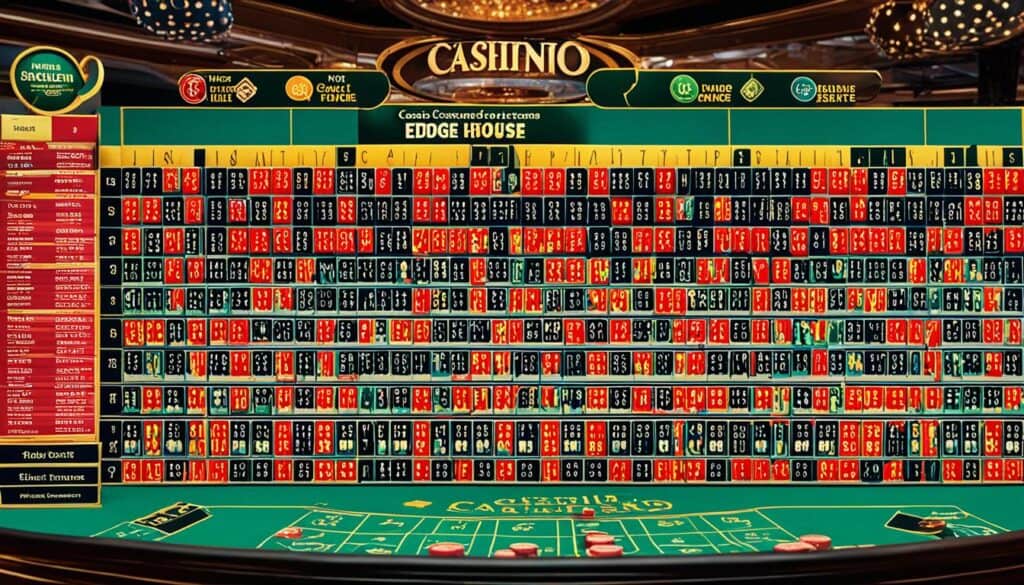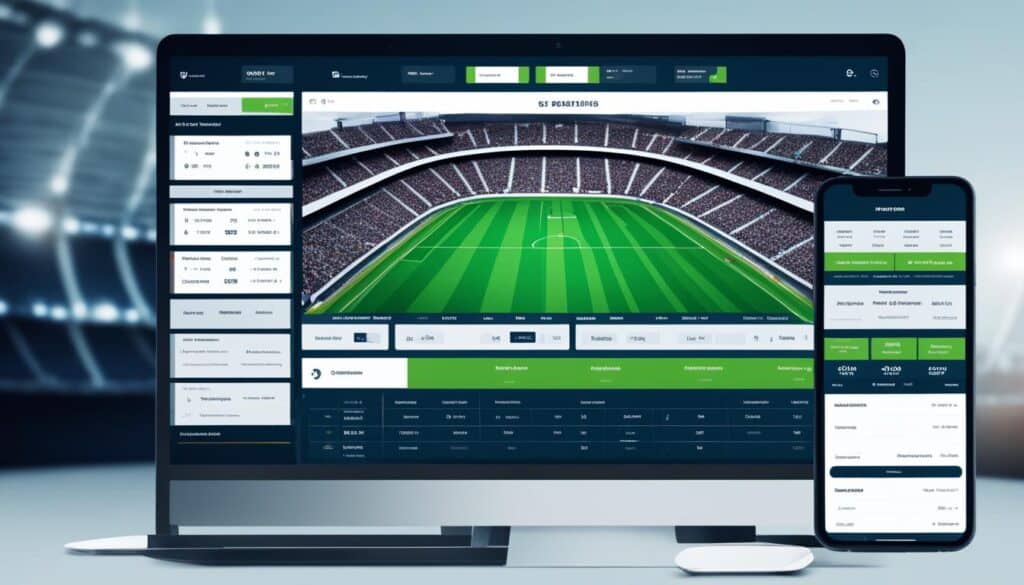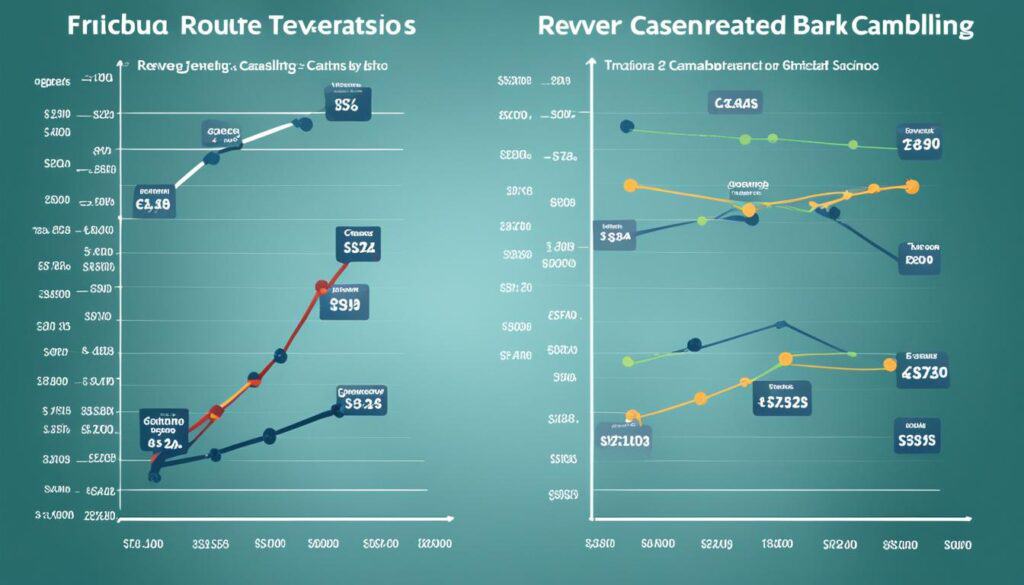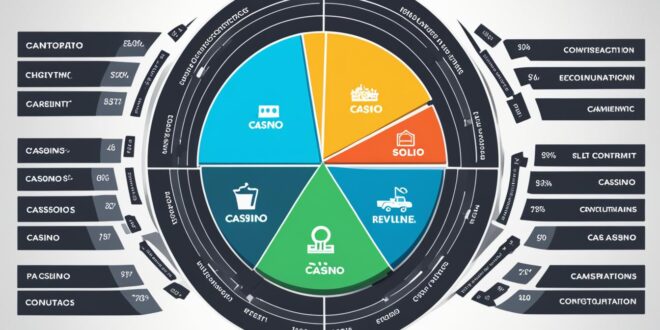Delving into the intricate business of betting, it’s evident that casinos are not merely playgrounds of chance but meticulously crafted profit models designed for revenue optimization. At the heart of casino revenue generation strategies lies a multifaceted approach that encompasses everything from game mechanics to psychological influences, all working in concert to ensure the house always has an edge.
Fundamental to their success is the implementation of the “house edge,” an in-built statistical advantage that favors the casino in the long run. Whether it’s a vibrant roulette wheel or the clamor of slot machines, every game in the casino repertoire is meticulously analyzed to produce sustained profitability. In this examination of casino economics, we unveil the precision and complexities driving one of the world’s most lucrative entertainment industries.
Understanding the House Edge

The concept of the house edge is fundamental to both the economics of gambling and casino revenue generation strategies. This mathematical advantage is ingrained in the very fabric of gambling activities, ensuring that the odds always favor the house. It’s a simple truth that underpins the profitability of casinos: over time, the establishment is set to gain more from players than it loses.
At its core, the house edge ensures that casinos offer payout odds that are slightly less than the actual odds of winning. By so doing, they provide themselves with an in-built profit margin. For players, this means that the elusive ‘break even’ point is inherently designed to be just out of reach in the long-term scenario.
-
Blackjack, for instance, can boast a conspicuously low house edge, encouraging seasoned players to flock to the tables. With the house edge capable of dipping as low as 0.28%, it’s hailed as one of the more player-friendly games.
-
Contrastingly, keno lays on the opposite end of the spectrum. With a house edge that can sore to a staggering 40%, it operates as a veritable gold mine for the casino.
The pivotal insight to understanding the house edge is recognizing that it’s not about the money initially brought to the table by the player, but rather it’s about the total volume wagered. As players continue to bet, the house edge chips away at their stack, almost imperceptibly at first, but with increasing significance over time.
Mastering an understanding of the house edge is crucial for anyone involved in gambling, whether as a player aiming to maximize their chances, or as a casino operator strategizing to enhance revenue generation. It’s a principle that underscores the delicate balance between the thrill of potential wins and the practical realities of gambling economics.
As we delve deeper into the mechanics of the house edge, we unravel the intricacies of how seemingly minor percentage differences can have substantial impacts on both player experiences and casino coffers. This knowledge serves as a basis for informed gaming choices and strategic casino operation.
Exploring the Psychology Behind the House Edge

The intricate dance between casinos and players is defined by a deep psychological play, heavily influenced by the allure of potential winnings against the backdrop of the house edge. Understanding this dynamic reveals much about the economic impact of gambling and the strategies employed by casinos to maintain profitability.
The Lure of Potential Winnings
Despite the numerical evidence showcasing the advantages held by casinos, the thought of hitting the jackpot acts as a powerful motivator. The psychological impact is significant, with players often swayed more by hopes of winning than by the rational assessment of the house edge. This optimism is by no means accidental; it is a core aspect of the psychology behind betting and a testament to the effectiveness of the casino design in cultivating an environment of endless possibilities.
Behavioral Triggers and Casino Design
Every square inch of a casino’s layout is engineered to produce outcomes that benefit its bottom line. From the labyrinthine floor plans to the strategic absence of time-indicators like clocks and windows, casinos utilize an array of psychological triggers. The intention is clear: to keep patrons engrossed in the games, gently nudging them away from the reality of time passing, further anchoring their actions in the realms of the economic benefits of gambling provided to the establishment.
Complimentary Services: More Than Meets the Eye
Casinos are not merely places of betting; they are realms where complimentary services abound, each with an ulterior motive. Free drinks may seem generous, but they are a part of sophisticated casino revenue generation strategies. Lowered inhibitions mean bolder bets and lengthier play, with players often unaware of the psychological maneuvering at play. This fine-tuned blend of hospitality and calculated manipulation exemplifies the marriage between the economic impact of gambling and the innovative betting business models that drive the industry forward.
Innovative Betting Business Models

The landscape of the gambling industry is perpetually evolving, with casinos and online betting platforms constantly scouting for innovative betting business models to captivate and sustain a solid customer base. In this fiercely competitive space, the introduction of trailblazing betting formats, combined with advanced technologies, has redefined the economics of gambling, leading to a rise in profitability and enhanced user engagement.
Crucial to this transformation is the growing role of affiliate marketing in the betting industry. This performance-based marketing approach has become an integral part of the promotional strategy for many betting companies. By leveraging a network of affiliates who advertise their services to potential customers, these entities have found a cost-effective method to drive traffic and increment registrations, subsequently boosting their customer acquisition numbers.
Furthermore, the integration of mobile and online platforms has opened up new avenues for user interaction, allowing bettors to place wagers conveniently from any location, thereby expanding the potential consumer market and ensuring the constant flow of engagement. The fusion of these strategies coalesces into an economic paradigm that pushes the boundaries of traditional betting businesses, paving the way toward a more dynamic future.
- Introduction of advanced betting options accommodating diverse preferences
- Expansion of loyalty and reward programs to establish and retain a loyal customer base
- Utilization of cutting-edge technology to provide seamless user experiences
- Leverage of affiliate marketing strategies to widen the customer reach
- Development of user-friendly mobile applications, fostering greater accessibility and convenience
These innovative betting business models are part of the broader economics of gambling, demonstrating a clear shift in approach as the industry continues to adapt to consumer demands and technological advancements. Their implementation not only reflects an ambition to generate revenue but also an understanding of the modern gambler’s psyche and habits. By staying at the forefront of innovation, betting businesses are ensuring their growth and sustainability in a rapidly changing economic landscape.
The Impact of Regulatory Changes on Gambling Economics

The landscape of gambling economics has undergone considerable shifts following a number of legislative changes. The ripple effect of these adjustments continues to shape the industry in numerous ways, from betting practices to economic growth in related sectors. An in-depth exploration of these changes highlights the nuanced interplay between policy and market economics in the gambling sphere.
Post-PASPA: A New Betting Landscape
The Supreme Court’s landmark decision in 2018 to overturn PASPA ushered in a new era of sports betting within the United States. States gained the autonomy to craft and implement their own sports betting regulations, which has led to a burgeoning market replete with both opportunities and challenges. This post-PASPA era has not only altered the way consumers bet but has also had significant implications regarding the economic impact of gambling.
State-by-State Gambling Expansion
Since the PASPA repeal, the United States has witnessed a domino effect with numerous states legalizing sports betting, each with varying degrees of regulatory oversight. The absence of a uniform federal standard has led to a mosaic of state-specific gambling landscapes, with each state’s approach impacting local economies and the gaming industry differently. This state-by-state gambling expansion is emblematic of the diverse stances towards balancing economic benefits with consumer protections.
International Gambling Regulations
While U.S. regulatory changes take the spotlight, international gambling regulations also significantly influence global betting dynamics. Countries across the world grapple with their own gambling policies, leading to a global patchwork of regulations that reflect differing priorities and economic strategies. Variations in regulatory frameworks from one jurisdiction to another can result in disparate economic effects, shaping the global gambling economy in complex ways.
The comprehensive analysis of legislative tweaks, both domestic and international, is crucial for stakeholders seeking to navigate the ever-evolving tapestry of global gambling economics. As countries continue to refine their gambling industries, understanding the nuances of regulatory changes will remain pivotal in predicting and capitalizing on future market trends.
Casino Profit Models

At the heart of every successful casino lies a deeply integrated network of profit models that propel the business of betting. The efficacy of these models lies in their multifaceted approach to revenue generation, meticulously structured and well-executed to ensure continuous growth and sustainability within the competitive market. Understanding how these models operate gives insight into the economic fortitude of casinos.
Casinos, benefiting from the inherent house edge, apply these profit models not only to gaming activities such as slots and table games but also extend their approach to various other domains. Each element of the casino environment is attuned to optimize customer expenditure and enhance overall profitability.
- Rigorous management of gaming odds and payout rates to align with profit goals.
- Diversification into non-gaming amenities like dining, entertainment, and accommodations.
- Investment in customer loyalty programs to encourage repeat business.
These models are designed to capture and enhance every potential stream of income, often turning the entire casino into both a gaming hub and a leisure destination. The following details encapsulate the essence of varied casino revenue generation strategies:
- Optimized layout and game placement to increase ‘foot fall’ and encourage higher spend per patron.
- Development of high-margin gaming options and leveraging popular trends.
- Strategic marketing campaigns aimed at both new customer acquisition and retention.
To maximize their casino profit models, establishments analyze and refine their strategies persistently. This adaptability not only serves to sustain their competitive edge but also addresses the dynamic preferences of their clientele. The intricate balance between offering appealing gaming avenues and ensuring profitable operations underscores the complexity of these models.
Suffice to say, a casino’s financial performance is the result of rigorous planning, sophisticated business acumen, and a customer-centric approach. As the landscape of gambling continues to evolve, so too will the intricacies of casino profit models, reaffirming the notion that the house always seeks to win.
Economics of Gambling

The intricate dance between profitability and responsibility defines the economics of gambling, a sector that has repeatedly proven to be a heavyweight in the entertainment industry. With a fine balance struck between its facilitation of economic benefits and the administration of its social influences, the gambling industry stands as a pillar worth careful economic scrutiny.
Comparing Casino Revenues and Industry Growth
In the landscape of commercial gambling, U.S. casino revenues have consistently emerged as a goliath, dwarfing the financial outcomes of the movie and music industries when they are combined. This significant market performance not only highlights the growth of the gambling industry but also underscores its scalability and its important role in economic development. Growth indicators in this sector represent more than mere financial success; they mirror the burgeoning acceptance and integration of gambling into mainstream entertainment.
The Cost-Benefit Analysis of Gambling
At the heart of understanding the economic contribution of gambling is a complex cost-benefit analysis, which seeks to balance the economic stimulation provided by the industry with its associated social costs. The positive spin-offs are undeniable: employment opportunities bloom, local economic landscapes are energized, and community coffers are bolstered. However, these benefits are not without caveats, as gambling venues have also been tied to upticks in social welfare costs, including repercussions like increased crime rates, poverty, and unemployment.
- Employment growth and community development
- Increased tourism and recreation revenue
- Challenges to local businesses and potential increase in social services demand
As the gambling industry continues to expand, the necessity for a judicious approach to its economics becomes increasingly paramount, ensuring that policy-makers and stakeholders are conscious of not just the industry’s profitability, but also of its broader societal implications.
Affiliate Marketing in the Betting Industry

The landscape of the betting industry has been significantly reshaped by the integration of affiliate marketing, a strategy that is both innovative and instrumental in crafting profitable business models within this sector. This approach has proven to be a pivotal element of modern innovative betting business models, driving customer acquisition and widening the market presence for gambling entities.
Affiliate marketing works by forming partnerships between betting operators and individual marketers or marketing companies. These affiliates use their marketing expertise to promote betting services and, in turn, receive compensation based on the engagement or revenue generated through their referrals. The symbiosis between betting businesses and affiliates has led to an explosion in the diversity of promotional tactics and the efficiency of reaching potential bettors.
- Content marketing through blogs, social media, and informational websites to engage with audiences.
- Utilizing SEO strategies to enhance online visibility and drive targeted traffic to betting platforms.
- Email campaigns that deliver tailored offers and updates to encourage repeated engagement and foster brand loyalty.
- Incentivizing new customers with bonuses or special offers when signing up through an affiliate’s referral.
Through the effective use of affiliate marketing, betting companies can leverage a wider network of promoters, capitalizing on their reach to tap into new demographics and markets. The performance-based nature of this marketing style ensures that affiliates are motivated to drive quality traffic that has a higher chance of converting into active users, thus aligning their goals directly with the financial aspirations of the betting business.
As the digital sphere grows ever more competitive, affiliate marketing in the betting industry stands as a testament to the innovative approaches companies must undertake to maintain and amplify profitability. Harnessing the power of collaborative promotion, betting operators can effectively scale their customer base, while affiliates enjoy the fruits of their marketing prowess, creating a robust and mutually beneficial ecosystem in the betting industry.
Economic Impact of Gambling

Gambling’s role in society stretches beyond entertainment, partaking significantly in economic development and encountering various socio-economic challenges. Its proliferation, especially in areas where gambling is a substantial industry, brings multifaceted consequences affecting both local economies and the social framework of communities.
Effects on Employment and Local Economies
Casinos and gambling establishments are often considered to be catalysts for employment, generating a wide range of job opportunities – from hospitality roles to sophisticated managerial positions. Their presence can invigorate local economies, providing an influx of jobs, and stimulating growth in related sectors. However, these positive outcomes are sometimes offset by the displacement effect, where existing businesses lose out to the allure of casino-backed entertainment zones.
- Job creation and enhanced skill development in communities.
- Increased economic activity through the provision of ancillary services.
- Potential displacement of local businesses lead to a shift in the economic structure.
Social Costs of Gambling
Alongside the economic benefits, the prevalence of gambling can incur tangible social costs. Problem gambling can lead to serious personal and social issues, including healthcare costs, strained relationships, and loss of productivity due to gambling addiction. Responsible gambling and effective regulation become key in mitigating these effects, ensuring gambling’s economic impact does not overshadow its social responsibilities.
- Increase in resource allocation for gambling addiction treatment and prevention programs.
- Economic strain from loss of productivity and potential legal issues arising from problematic gambling behaviors.
- The imperative for responsible gambling practices to curtail the development of gambling disorders.
The “Business of Betting”: An Industry Overview

The global arena of gambling, revered as the business of betting, straddles a vast spectrum of activities – from the clattering slot machines and green felt of casino tables to the digital rapidity of online sports betting platforms. Engrossing a stunning valuation in the hundreds of billions, the industry owes its pulsing vitality to intricate casino profit models devised to allure avid punters, uphold a house lead, and perpetually innovate through technological inventions and astute responses to fluctuating regulations. This nuanced tapestry weaves together a hefty thread of economic benefits of gambling alongside systemic stratagems that bolster its international dominion.
- Intricate networks of gaming – both physical and virtual – beckon a diverse clientele.
- The omnipresence of the ‘house edge’ fortifies the casino’s vaults.
- Strategic marketing and loyalty programs serve to tether players to betting parlors and digital platforms alike.
- Regulatory landscapes across the globe shape shifts in market accessibility and practices.
- Substantial contributions to tourism and local economies are buttressed by the sector’s expeditious growth.
As a pillar of the leisure and entertainment industry, the business of betting not only thrives on the ‘thrill of the gamble’ but also on the ever-green yield of its methodically structured profit schemes. These models don’t simply accentuate the allure of potential jackpots; they encode the operational DNA of gambling ventures, from Vegas’s neon dazzle to Monaco’s opulent corners and cyberspace’s border-defying casinos.
While the immediate vision of casino floors teeming with hopeful gamers is arresting, the long rung of economic benefits perpetuated by the industry cannot be understated. These range from amplified employment opportunities in the casino-rich precincts to swelling state coffers abetted by gambling taxes – a resounding testament to the sector’s robust economic impact.
To encapsulate the prodigious expanse of the betting business is to acknowledge its core – a potent blend of anticipation, strategy, and an unyielding quest for growth. As it continually redefines its contours to parallel the strides of technology and policy, it remains an archetype of a profit-laden and dynamic industry.
Casino Revenue Generation Strategies

In the landscape of modern gambling, casinos are constantly refining their revenue optimization tactics to stay competitive and lucrative. Understanding and implementing cutting-edge casino revenue generation strategies is imperative for thriving in the industry.
From Table Games to Slot Innovations
Table games have long been a staple in casinos, offering both timeless allure and consistent profitability. Yet, it’s the slot machine innovations that have revolutionized the way casinos enhance guest experience and increase revenue. With numerous slot machine innovations, casinos are now offering immersive thematic experiences and advanced bonus rounds, drawing players to spend more time and money on these captivating machines.
Slot advancements are not solely based on aesthetics and engagement; they also involve behind-the-scenes technology that optimizes for table games profitability. Implementing cashless payment systems and tracking player data for personalized experiences are among the innovative methods that simultaneously cater to customer preferences and bolster casino revenue streams.
Customer Retention Tactics
To ensure a steady flow of revenue, maintaining a robust base of returning customers is paramount. The implementation of savvy customer retention tactics in gambling can deeply influence a casino’s success. Loyalty programs are a prime example, offering rewards and incentives for frequent players, and are a cornerstone of successful casino marketing strategies.
- Exclusive promotions targeting high-value customers
- Personalized customer service for an enhanced gaming experience
- Events and tournaments designed to build community and engagement
By investing in these customer-centric initiatives, casinos not only secure recurring business but also establish a brand reputation that draws new patrons, effectively sustaining and expanding their market presence within the gambling sector.
Impact of Big Data on Casino Profitability

The utilization of big data has revolutionized numerous industries, and the casino sector is no exception. With the emergence of innovative betting business models, the capacity to harness vast amounts of data has become pivotal in driving profitability. Big data is transforming the way casinos understand and engage with their customers, allowing for a more personalized gambling experience.
Big data’s influence touches every corner of casino operations, from enhancing user experience to fine-tuning marketing strategies. Here’s how it shapes the landscape:
- Customer Behavior Analysis: By examining data patterns, casinos gain insights into player preferences and habits, enabling them to predict future behavior and tailor services accordingly.
- Gaming Floor Optimization: Data analytics aid in the layout of gaming floors to maximize revenue generation, placing the most popular and profitable games in strategic locations.
- Marketing Campaign Personalization: Casinos now develop personalized marketing initiatives based on player data, leading to more effective promotions and increased player retention.
- Enhanced Customer Experience: Through data, casinos can offer personalized rewards and experiences to guests, encouraging longer play times and higher spend.
- Trend Prediction: By analyzing big data, casinos can stay ahead of industry trends and adapt more quickly to the evolving marketplace.
The impact of big data on casino profitability lies in its ability to convert information into actionable strategies that drive decision-making. The modern casino is no longer just a place for gambling; it’s a hub for data-driven customer engagement, designed to understand and cater to every player’s preference.
With big data, the future of casinos looks more predictive, more dynamic, and unquestionably more profitable. The data-rich environment cultivates not only an increase in individual operator revenue but also propels the industry forward with innovative betting business models that leverage sophisticated analytical tools.
Economic Benefits of Gambling

The gambling industry is widely recognized for its immense revenue generation, but it extends its financial prowess to effect positive societal impacts and urban development. Examining the economic benefits of gambling reveals how this sector not only uplifts the entertainment landscape but also underpins numerous community enrichment initiatives and tourism enhancement efforts.
Charitable Contributions and Community Support
Going beyond the glitz and glamour of the casino floor, gambling establishments are significant contributors to society through charitable actions and community support. These philanthropic endeavors by casinos translate economic success into tangible benefits for the broader community.
- Many casinos donate a significant part of their profits to fund educational scholarships, supporting the future of young minds in the community.
- Social welfare programs, healthcare initiatives, and cultural projects often receive considerable funding from gaming revenues, demonstrating casinos’ commitment to societal well-being.
- Local infrastructure projects such as park rejuvenation, and public facilities enhancements are sometimes funded by charitable contributions from gambling establishments.
Boosting Tourism and Entertainment Sectors
Additionally, the gambling industry serves as a powerful catalyst for tourism, inviting a global audience to experience not only the thrill of gaming but also a plethora of associated entertainment options.
- Tourists are attracted to casino hubs for more than just gaming; they come for shows, dining experiences, and other attractions, thus supporting a vibrant tourism economy.
- The presence of casinos in a region can significantly increase visitor traffic, leading to a ripple effect of economic benefits for local businesses such as hotels, restaurants, and shops.
- By hosting international events and poker tournaments, casinos put cities on the map, enhancing their profile as must-visit destinations.
Global Betting Dynamics and Future Prospects
The landscape of global betting dynamics is in constant flux, propelled by relentless technological innovation and shifts in international gambling regulations. Gambling’s future is now inextricably linked to the digital realm, with online platforms becoming more prevalent and sophisticated. This transition presents both a challenge and an opportunity for the industry, requiring nimble adaptations to harness technology’s potential fully. Far from being confined to traditional brick-and-mortar establishments, the footprint of betting is expanding into the mobile and virtual worlds, creating a seamless, borderless experience for consumers.
While technology pushes the frontiers of gambling, the scope for future prospects in gambling is also widened by legislative changes. Countries around the world grapple with the task of adjusting international gambling regulations to protect consumers while allowing the industry to thrive. The balance of fostering economic growth and mitigating social risks is delicate; a coherent approach to regulation is integral for sustainable expansion. Countries that successfully navigate this regulatory landscape will likely emerge as leaders in the global betting market, setting standards and perhaps influencing policy worldwide.
The adaptability of the gambling industry to these evolving global betting dynamics will be paramount in realizing its full potential. As stakeholders endeavor to calibrate operations for this complex, interconnected ecosystem, the key will lie in sustaining economic viability while remaining vigilant stewards of ethical and responsible gambling practices. If managed with foresight and responsibility, the gambling industry’s future prospects promise expansive growth and innovation, all while contributing to the global economy and entertainment landscape.
 Online Gaming Circuit
Online Gaming Circuit




